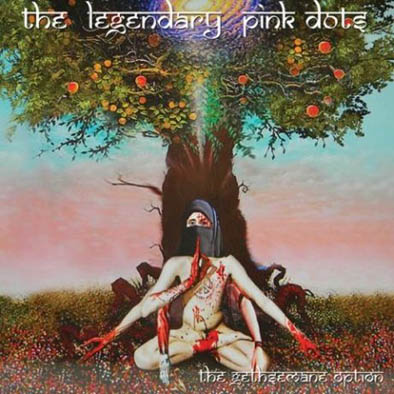 To the casual observer, it probably seems like either Edward Ka-Spel or The Legendary Pink Dots release (or re-release) an album just about every other week these days, but there has not actually been a major new LPD album since 2010's oft-brilliant Seconds Late for the Brighton Line.  While The Gethsemane Option does not quite measure up to that illustrious predecessor, it still boasts enough high points to make serious fans fairly happy.  Less serious fans probably only need to hear a few of the better pieces, but it is clear that Ka-Spel and company set out to deliver a coherent, deliberately sequenced album-sized dose of their signature skewed psychedelia and that its shortcomings are mostly the result of over-ambition.
To the casual observer, it probably seems like either Edward Ka-Spel or The Legendary Pink Dots release (or re-release) an album just about every other week these days, but there has not actually been a major new LPD album since 2010's oft-brilliant Seconds Late for the Brighton Line.  While The Gethsemane Option does not quite measure up to that illustrious predecessor, it still boasts enough high points to make serious fans fairly happy.  Less serious fans probably only need to hear a few of the better pieces, but it is clear that Ka-Spel and company set out to deliver a coherent, deliberately sequenced album-sized dose of their signature skewed psychedelia and that its shortcomings are mostly the result of over-ambition.
Appropriately enough, given their new home of Metropolis Records, "A Star is Born" opens the album on a brooding, quasi-industrial note, mixing a muted drum-machine groove, somber synthesizers, space-y studio tricks, creepily evocative lyrics, and sporadic bursts of static and noise to create a haunted and hallucinatory pop gem.  Initially, that impressive momentum continues unabated with "The Garden of Ealing," as it appealingly begins with squelching electronic percussion and an effectively enigmatic and surreal collage of movie/TV samples.  Gradually, it coheres into what is almost yet another fine song, as Ka-Spel's melody and lyrics are both quite strong and the underlying music maintains a nicely simmering degree of muted mindfuckery.
Unfortunately, the album's first signs of bloat and indulgence start to appear as well and they become an increasingly distracting issue as the album progresses, mostly manifesting themselves in meandering, overlong songs; over-the-top vocals; lengthy improvised passages; curiously dated textures; and rare instances of very ill-conceived lyrics.  Those shortcoming are doubly exasperating on this particular album because they are mingled with so many strong ideas and sustained bursts of inspiration.
As a result, most of these songs are mixed successes, but there are a couple of very low lows that I cannot even listen to all the way though, particularly the sing-song major key melody of "Esher Everywhere," which is additionally torpedoed by some '80s rock guitar soloing and very '70s prog synth noodling.  Equally misbegotten is the closing "One More Dimension," which clocks in at nearly ten minutes and painfully devotes much of its running time to Ka-Spel counting dimensions and clumsily, pointlessly rhyming ("Just two more dimensions, too many now to mention").
"One More Dimension" aside, however, the second half of The Gethsemane Option is actually fairly strong.  For example, the throbbing "Grey Scale" boasts some wonderful experimental weirdness in its periphery, along with some delightfully cryptic and paranoid-sounding Ka-Spel stream-of-consciousness and a woozy theremin.  The propulsively buzzing, grinding, and burblingly psychotropic "A Stretch in Time" scores yet again, offering up some instrumental passages that easily rank among LPD's best.  Still another high point is the 11-minute "Pendulums," which is basically just Ka-Spel delivering a very creepy, unnerving monologue over the slow pulse of a heartbeat and a deep clock chime.  It is marred somewhat by both its running time and some quizzical choices in synthesizer textures, but Edward is utterly magnetic when he is at his spoken-word best and the bed beneath him is the perfect foil for his storytelling (and for the gently roiling and whooshing maelstrom of spaciness that follows it).
Despite those successes (roughly half the album), The Gethsemane Option is ultimately a mild disappointment to my admittedly pessimistic ears, but it is a complicated one and my expectations were perhaps unreasonably high given the heights that some of LPD's recent work has reached (particularly The Creature That Tasted Sound and The Silverman's Finisterre).  There was definitely no shortage of inspiration or vision for this album, as nearly every song boasts a few excellent motifs and it all seems to flow together as a cryptically connected whole, but the band definitely had a hard time actually shaping all those ideas into great songs: only "A Stretch in Time" and "A Star is Born" manage to make it all the way through their running time without succumbing to the band's more eccentric and indulgent tendencies.  Of course, those tendencies are an inherent and essential part of the Dots' aesthetic, playing as much a role in their distinctiveness and success as they do in their mis-steps.  Some other LPD albums certainly strike a more favorable balance of those extremes, but The Gethsemane Option is still mostly a fine effort.
 
Read More

